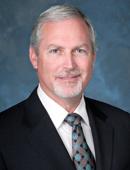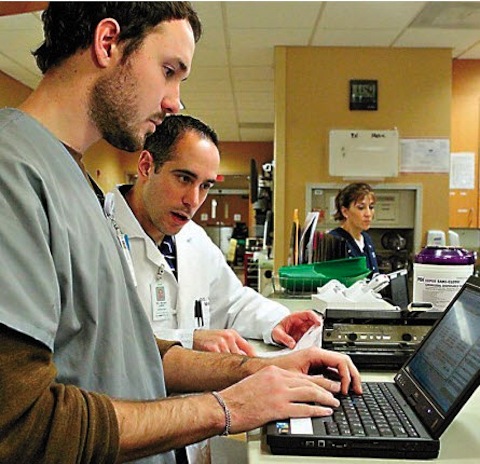Daily Business Report-Nov. 19, 2014
Medical scribe is one of the new jobs emerging from the health care industry, according to a report by the Center for Professional Advancement at San Diego-based AMN Healthcare.
New Jobs Emerging in Health Care Industry
Survey shows Affordable Care Act, aging population among factors driving new workforce roles
New clinical and leadership jobs that didn’t exist a decade ago are emerging from the transformation of our national health care system, according to the results of a just-released survey by the Center for Professional Advancement at San Diego-based AMN Healthcare.
The survey, Emerging Roles in Healthcare, polled more than 300 clinical and human resources leaders nationwide about trends in hiring and training for new and emerging health care positions. Many of the new positions are arising in response to new regulatory incentives and mandates from the Affordable Care Act, particularly for transitioning from volume- to value-based care.
Other factors such as controlling costs and providing care for an aging population also were cited in the survey.
Among survey respondents, 86 percent said they recognized the growing need for new types of health care positions, but relatively low percentages, in many cases, said they are actively preparing for this need.
“Both the data and the comments gathered by the survey show that health care leaders understand the importance of these emerging roles in the new health care environment,” said Marcia Faller, RN, chief clinical officer at AMN Healthcare. “But not that many health care enterprises are actively recruiting or training for these jobs, especially when it comes to new strategic leadership roles.”
Among the new jobs in health care are clinical roles of care coordinator, navigator, health coach, medical scribe and telehealth-trained practitioner; leadership roles of chief population health officer, chief experience officer, chief clinical transformation officer and chief strategy officer; and technical roles of clinical documentation specialist and ICD-10 Coder.
Susan Salka, president, CEO and director of AMN Healthcare, said the emergence of new health care positions is part of the industry’s ongoing transformation to new care models and redefined reimbursement formulas that emphasize quality-of-care indicators.
“For example, the increase in chronic conditions among older people and the push to reduce readmissions and improve patient satisfaction require greater care coordination between patient, provider and payer,” Salka said. “So it’s not surprising that the clinical position of care coordinator, which was relatively unknown a few years ago, is today in great demand.”
“Health care is the most dynamic employment sector in the country, not only in job growth but now also in the emergence of new types of jobs,” Salka said. “High demand for health care professionals will continue for the foreseeable future. This survey suggests that health care providers will need help in preparing for it.”
Jewish Community Foundation
Tops $1 Billion in Charitable Grants
The Jewish Community Foundation of San Diego has surpassed the $1 billion milestone in charitable grants since its inception in 1967. The foundation is the largest grantmaker in the San Diego region, exceeding $100 million in grants annually to strengthen nonprofits.
The $1 billion milestone was reached this fall. The foundation manages more than 700 endowment and donor advised funds with over $300 million in assets. In its 47-year history, more than 60,000 grants have been made to 5,000 community and charitable organizations. About 75 percent of these grants supported programs in the San Diego region.
“We are extremely proud to surpass the $1 billion grantmaking milestone,” said Jane Scher, foundation board chair. “Reaching this point is a result of inspired philanthropists who follow their passions and deeply impact lives for the better with every grant.”

SDSU Starts Work on $143 Million
Student Housing and Retail Project
San Diego State University will break ground today on its $143 million South Campus Plaza, a mixed-use student housing and retail project set to open next fall.
The finished project on the former Plaza Linda Verde site at the intersection of Campanile Drive and Hardy Avenue, just south of the SDSU Transit Center, will house more than 600 students and retail outlets that will serve students and campus-adjacent residents, according to SDSU.
The South Campus Plaza’s residence halls will feature double-occupancy student rooms, along with apartments for residential education staff and visitors, according to the university. The building will also include study areas, lounges, a community kitchen, a mail room, bicycle storage and a laundry room.
Plans for the retail component include a community market, restaurants and other shops. Negotiations with future tenants are underway, according to the university.
The project will be constructed in two phases, beginning with two residential buildings, above ground-floor retail and an adjacent parking structure.
No proposed date was provided for the start of phase two, which will be located on the east side of College Avenue.
— City News Service
City Council Unanimously OKs
Ambitious Water Recycling Plan
The City Council on Tuesday unanimously approved a major step toward recycling San Diego’s waste water into drinking water.
“The innovative Pure Water project is an investment in our future that will provide San Diego the reliable water supply we need for our economy to grow and our city to thrive,” said Mayor Kevin Faulconer in a statement after the vote. “I thank the City Council for its support.”
The vote officially sought renewal of a federal permit needed to continue operations of the Point Loma Wastewater Treatment Plant. Within the plan, however, is a commitment by the city to begin a $3.5 billion project to recycle water for potable use.
Supporters hope the pledge will allow the city to avoid spending $2 billion to upgrade the aging treatment plant. While the outlay is higher, the payoff would be a new, stable source of water for the drought-prone city.
The project is touted as being able to recycle enough purified water to make up a third of San Diego’s drinking water in 2035. A demonstration plant in Miramar is already producing a million gallons a day of recycled water that is cleaner than what comes from the Colorado River.
“This is one of the city’s most critical projects that will help our region grow and thrive, and establish San Diego as a national environmental leader,” Faulconer said at an event last week.
Environmental groups like San Diego Coastkeeper, Surfrider Foundation San Diego Chapter, Coastal Environmental Rights Foundation and the San Diego Audubon Society all back the city’s approach.
“San Diego is at the end of the pipe, and we need solutions now,” said Coastal Environmental Rights Foundation Executive Director Marco Gonzalez. “This is going to give us a new, drought-proof water source that we desperately need to succeed as a region.”
Often derided with names like “toilet-to-tap,” a multi-step cleansing process being tested by the city 1 million gallons daily produces water cleaner than what residents drink now and meets or exceeds quality standards, according to backers of the plan.
The project would be paid for by a mix of state and federal grants, and rate increases on consumers.
— Times of San Diego with City News Service
Attorney Richard Huver to Head
San Diego County Bar Association

Attorney Richard Huver, a solo practitioner at Huver Law Firm, will be sworn in as the president of the San Diego County Bar Association on Dec. 5. Practicing for nearly 30 years, Huver specializes in personal injury, wrongful death, premises liability, products liability and insurance bad faith law. He has served on the board of directors since 2011, and was elected treasurer in 2013.
Heather Riley, senior counsel at Allen Matkins, was elected president-elect, and will serve as SDCBA president in 2016. 2014 President Jon Williams will serve on the board for an additional year as immediate past president.
Attorneys Jodi Cleesattle, Roger Haerr, Rick Layon, Lilys McCoy and Dino Paraskevopoulos were elected to serve three-year terms on the board. Ilona Antonyan, Dan Bacal, Andy Cook, James Crosby, Ray Estolano, Loren Freestone, Lizzette Herrera Castellanos, Danielle Hickman and Kristin Rizzo will continue their service in 2015. Nicole Heeder, chair of the association’s Forum for Emerging Lawyers, will also serve a one-year term on the Board.
The 2015 board will be sworn in to office at Stepping Up to the Bar, the annual holiday reception.

Missions at Rancho Del Oro Apartments Sold
OCEANSIDE — Missions at Rancho Del Oro, a 284-unit luxury apartment home community in Oceanside, has been sold to a privately held, Georgia-based real estate investment firm. The seller was an institutional owner based in New York. CBRE Multifamily Investment Properties group represented the seller.
Built in 2001, Missions at Rancho Del Oro features a mix of one-, two- and three-bedroom floor plans averaging 962 square feet. Community amenities include a courtyard pool, spa, barbecue areas, children’s playground, grassy picnic area, a clubhouse building, modern fitness center, game room, business center and a media room with theater seating and surround sound.
$1.25 Million Donation to Launch
Coryell Legacy at San Diego State

San Diego State University Athletics has launched a campaign to provide scholarship support for student athletes. The Aztec Club, the fundraising arm of Athletics, has set a goal of 5,000 members who will support scholarships through the Coryell Legacy — a giving society for donors to contribute endowments and estate gifts.
“We are pleased to announce a $1.25 million estate gift from Robin and Bill Sinclair to launch the Coryell Legacy,” said SDSU Director of Athletics Jim Sterk. “The Sinclairs were first time donors to the university in 2012 and have quickly become very passionate supporters of the Aztecs.”
Named in honor of Don Coryell, the winningest coach in Aztec football history, the Coryell Legacy will be funded through endowments and estate gifts for Aztec Athletics. With an endowment goal of $20 million, the Coryell Legacy will help ensure the financial future of the Department of Athletics and the success of its student-athletes, club officials said.
In making an estate gift to the Coryell Legacy, the Sinclairs signaled their support for the academic and the athletic achievements of SDSU. “Bill and I are not alumni, but we love the Aztecs,” Robin said. “From the personable student-athletes to the hard working coaches and staff, we feel SDSU Athletics is a perfect match for our philanthropic priorities, and we are pleased to make this commitment in addition to our annual giving.”
Qualcomm to Give $500,000 for Chinese Scholarships
Qualcomm Inc. will give $500,000 to fund scholarships for students studying engineering and computer science at two Chinese universities, the San Diego-based company announced today. The scholarship funds being given to students at Peking University and Tsinghua University mark Qualcomm’s “commitment to promote and improve science, technology, engineering and math education, and expand opportunities for young innovators in China,” according to a company statement.
Qualcomm said that Peking University will receive $100,000 while Tsinghua will receive $400,000. Peking University will use the money to create two endowed scholarships per year in perpetuity. Tsinghua will fund thirty-three scholarships each year for four school years.
“Qualcomm has a long history of invention, and we believe that fostering the next generation of inventors is essential to sustaining continuous growth and innovation in China’s flourishing technology industry,” said Xiang Wang, president of Qualcomm Greater China.
China is a major market for Qualcomm, though it has come under pressure from the Chinese government, which has accused a number of American companies of unfair business tactics.
— Times of San Diego
UC Board of Regents to Take Up
Tuition Hike Proposal Today
Students at UC San Diego and other UC campuses across the state will have their eyes on San Francisco today, where the university system’s Board of Regents is scheduled to begin considering a proposal to hike tuition by 5 percent a year over the next five years.
The proposal has been met with outrage by students, many of whom took part in campus marches Tuesday. At UC San Diego, students staged a sit-in in front of Geisel Library as part of the “Day of Action Against the UC Tuition Plan.”
UCSD student Anali Valdez said that if the increase is approved, it would mean a 287 percent tuition increase between 2002 and 2020. “That’s insane,” she told Fox 5.
Under the proposal, in-state students would pay $612 more for the 2015-16 school year, or $12,804. Out-of-state students would pay the same increased rate, plus a nonresident fee of $22,878, which would also increase by the same percentage, according to the university system.
Assembly Speaker Toni Atkins, D-San Diego, who is a member of the Board of Regents, is among those sympathizing with the students. In a statement, Atkins said she would reject the proposal and instead suggest that the university system receive an additional $50 million from the state’s general fund.
Gov. Jerry Brown also opposes the proposed hike, as does Lt. Gov. Gavin Newsom, an ex-officio regent, and Rep. John Garamendi, D-Fairfield, a former member of the UC Board of Regents and California State University trustee.



